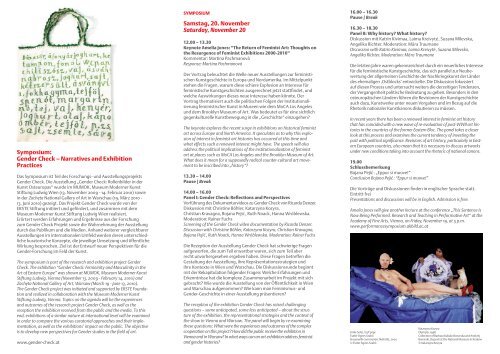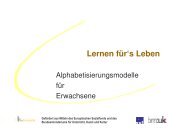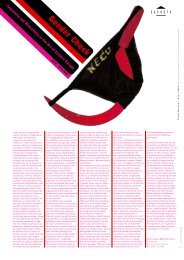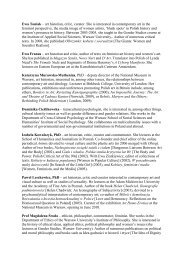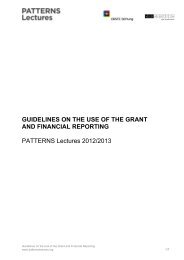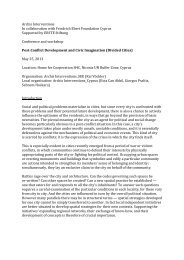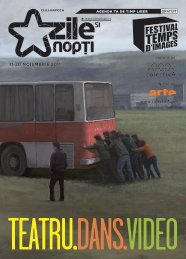Gender Check - ERSTE Stiftung
Gender Check - ERSTE Stiftung
Gender Check - ERSTE Stiftung
Sie wollen auch ein ePaper? Erhöhen Sie die Reichweite Ihrer Titel.
YUMPU macht aus Druck-PDFs automatisch weboptimierte ePaper, die Google liebt.
Symposium:<br />
<strong>Gender</strong> <strong>Check</strong> – Narratives and Exhibition<br />
Practices<br />
Das Symposium ist Teil des Forschungs- und Ausstellungsprojekts<br />
<strong>Gender</strong> <strong>Check</strong>. Die Ausstellung „<strong>Gender</strong> <strong>Check</strong>: Rollenbilder in der<br />
Kunst Osteuropas“ wurde im MUMOK, Museum Moderner Kunst<br />
<strong>Stiftung</strong> Ludwig Wien (13. November 2009 - 14. Februar 2010) sowie<br />
in der Zache˛ta National Gallery of Art in Warschau (19. März 2010 -<br />
13. Juni 2010) gezeigt. Das Projekt <strong>Gender</strong> <strong>Check</strong> wurde von der<br />
<strong>ERSTE</strong> <strong>Stiftung</strong> initiiert und gefördert, und zusammen mit dem<br />
Museum Moderner Kunst <strong>Stiftung</strong> Ludwig Wien realisiert.<br />
Erörtert werden Erfahrungen und Ergebnisse aus der Forschung<br />
zum <strong>Gender</strong> <strong>Check</strong> Projekt sowie die Wahrnehmung der Ausstellung<br />
durch das Publikum und die Medien. Anhand weiterer vergleichbarer<br />
Ausstellungen im internationalen Umfeld werden deren unterschiedliche<br />
kuratorische Konzepte, die jeweilige Umsetzung und öffentliche<br />
Wirkung besprochen. Ziel ist der Entwurf neuer Perspektiven für die<br />
<strong>Gender</strong>-Forschung im Feld der Kunst.<br />
The symposium is part of the research and exhibition project <strong>Gender</strong><br />
<strong>Check</strong>. The exhibition “<strong>Gender</strong> <strong>Check</strong>: Femininity and Masculinity in the<br />
Art of Eastern Europe” was shown at MUMOK, Museum Moderner Kunst<br />
<strong>Stiftung</strong> Ludwig, Vienna (November 13, 2009 - February 14, 2010) and<br />
Zache˛ta National Gallery of Art, Warsaw (March 19 - June 13, 2010).<br />
The <strong>Gender</strong> <strong>Check</strong> project was initiated and supported by <strong>ERSTE</strong> Foundation<br />
and realized in collaboration with the Museum Moderner Kunst<br />
<strong>Stiftung</strong> Ludwig, Vienna. Topics on the agenda will be the experiences<br />
and outcomes of the research project <strong>Gender</strong> <strong>Check</strong>, as well as the<br />
reception the exhibition received from the public and the media. To this<br />
end, exhibitions of a similar nature at international level will be examined<br />
in order to compare the various curatorial approaches and their implementation,<br />
as well as the exhibitions’ impact on the public. The objective<br />
is to develop new perspectives for <strong>Gender</strong> studies in the field of art.<br />
www.gender-check.at<br />
SYMPOSIUM<br />
Samstag, 20. November<br />
Saturday, November 20<br />
12.00 – 13.30<br />
Keynote Amelia Jones: “The Return of Feminist Art: Thoughts on<br />
the Resurgence of Feminist Exhibitions 2000-2010”<br />
Kommentar: Martina Pachmanová<br />
Response: Martina Pachmanová<br />
Der Vortrag beleuchtet die Welle neuer Ausstellungen zur feministischen<br />
Kunstgeschichte in Europa und Nordamerika. Im Mittelpunkt<br />
stehen die Fragen, warum diese schiere Explosion an Interesse für<br />
feministische Kunstgeschichten ausgerechnet jetzt stattfindet, und<br />
welche Auswirkungen dieses neue Interesse haben könnte. Der<br />
Vortrag thematisiert auch die politischen Folgen der Institutionalisierung<br />
feministischer Kunst in Museen wie dem MoCA Los Angeles<br />
und dem Brooklyn Museum of Art. Was bedeutet es für eine sichtlich<br />
gegenkulturelle Kunstbewegung in die „Geschichte“ einzugehen?<br />
The keynote explores the recent surge in exhibitions on historical feminist<br />
art across Europe and North America. It speculates as to why this explosion<br />
of interest in feminist art histories has occurred at this time and<br />
what effects such a renewed interest might have. The speech will also<br />
address the political implications of the institutionalization of feminist<br />
art at places such as MoCA Los Angeles and the Brooklyn Museum of Art.<br />
What does it mean for a supposedly radical counter-cultural art movement<br />
to be inscribed into „history“?<br />
13.30 – 14.00<br />
Pause / Break<br />
14.00 – 16.00<br />
Panel I: <strong>Gender</strong> <strong>Check</strong>: Reflections and Perspectives<br />
Vorführung des Dokumentarvideos zu <strong>Gender</strong> <strong>Check</strong> von Ricarda Denzer.<br />
Diskussion mit Christine Böhler, Katarzyna Kozyra,<br />
Christian Kravagna, Bojana Pejić, Ruth Noack, Hanna Wróblewska.<br />
Moderation: Rainer Fuchs<br />
Screening of the <strong>Gender</strong> <strong>Check</strong> video documentation by Ricarda Denzer.<br />
Discussion with Christine Böhler, Katarzyna Kozyra, Christian Kravagna,<br />
Bojana Pejić, Ruth Noack, Hanna Wróblewska. Moderation: Rainer Fuchs<br />
Die Rezeption der Ausstellung <strong>Gender</strong> <strong>Check</strong> hat schwierige Fragen<br />
aufgeworfen, die zum Teil erwartbar waren, sich zum Teil aber<br />
recht unvorhergesehen ergeben haben. Diese Fragen betreffen die<br />
Gestaltung der Ausstellung, ihre Repräsentationsstrategien und<br />
ihre Kontexte in Wien und Warschau. Die Diskussionsrunde beginnt<br />
mit der Rekapitulation folgender Fragen: Welche Erfahrungen und<br />
Erkenntnisse hat die komplexe Zusammenarbeit im Projekt mit sich<br />
gebracht? Wie wurde die Ausstellung von der Öffentlichkeit in Wien<br />
und Warschau aufgenommen? Wie kann man Feminismus- und<br />
<strong>Gender</strong>-Geschichte in einer Ausstellung präsentieren?<br />
The reception of the exhibition <strong>Gender</strong> <strong>Check</strong> has raised challenging<br />
questions – some anticipated, some less anticipated – about the structure<br />
of the exhibition, the representational strategies and the context of<br />
the show in Vienna and Warsaw. The panel will begin by re-examining<br />
these questions: What were the experiences and outcomes of the complex<br />
cooperation on this project? How did the public receive the exhibition in<br />
Vienna and in Warsaw? In what ways can an art exhibition address feminist<br />
and gender histories?<br />
16.00 – 16.30<br />
Pause / Break<br />
16.30 – 18.30<br />
Panel II: Why history? What history?<br />
Diskussion mit Katrin Kivimaa, Laima Kreivyte˙, Suzana Milevska,<br />
Angelika Richter. Moderation: Māra Traumane<br />
Discussion with Katrin Kivimaa, Laima Kreivyte˙, Suzana Milevska,<br />
Angelika Richter. Moderation: Māra Traumane<br />
Die letzten Jahre waren gekennzeichnet durch ein neuerliches Interesse<br />
für die feministische Kunstgeschichte, das sich parallel zur Neubewertung<br />
der allgemeinen Geschichte der Nachkriegskunst der Länder<br />
des ehemaligen ‚Ostblocks’ entwickelte. Die Diskussion fokussiert<br />
auf diesen Prozess und untersucht weiters die derzeitigen Tendenzen,<br />
der Vergangenheit politische Bedeutung zu geben. Besonders in den<br />
osteuropäischen Ländern führen die Revisionen der Kunstgeschichte<br />
auch dazu, Kunstwerke unter neuen Vorgaben und im Bezug auf die<br />
Rhetorik nationaler Kunstkanons diskutieren zu müssen.<br />
In recent years there has been a renewed interest in feminist art history<br />
that has coincided with a new wave of re-evaluation of post-WWII art histories<br />
in the countries of the former Eastern Bloc. The panel takes a closer<br />
look at this process and examines the current tendency of investing the<br />
past with political significance. Revisions of art history, particularly in Eastern<br />
European countries, also mean that it is necessary to discuss artworks<br />
under new conditions taking into account the rhetoric of national canons.<br />
19.00<br />
Schlussbemerkung<br />
Bojana Pejić: „Eppur si muove!”<br />
Conclusion Bojana Pejić: “Eppur si muove!”<br />
Die Vorträge und Diskussionen finden in englischer Sprache statt.<br />
Eintritt frei<br />
Presentations and discussions will be in English. Admission is free.<br />
Amelia Jones will give another lecture at the conference „This Sentence Is<br />
Now Being Performed. Research and Teaching in Performative Art“ at the<br />
Academy of Fine Arts, Vienna, on Friday, November 19, at 5 p.m.<br />
www.performancesymposium.akbild.ac.at<br />
Linke Seite / Left page<br />
Eszter Ágnes Szabó<br />
Housewife commando: Nefertiti, 2000<br />
© Eszter Ágnes Szabó<br />
Katarzyna Kozyra<br />
Olympia, 1996<br />
Collection of Barbara Kabala-Bonarska and Andrzej<br />
Bonarski, Deposit at the National Museum in Krakow<br />
© Katarzyna Kozyra
REAdERPRäSENTATION<br />
READER PRESENTATION<br />
Freitag, 19. November<br />
Friday, November 19<br />
19.00<br />
Buchpräsentation und diskussion / Book Launch and Talk:<br />
<strong>Gender</strong> <strong>Check</strong>: A Reader – Art and Theory in Eastern Europe<br />
Statement der Herausgeberin: Bojana Pejić<br />
Kommentare und Diskussion: Angela Dimitrakaki, Johanna Schaffer<br />
Editor’s statement: Bojana Pejić<br />
Comments and discussion: Angela Dimitrakaki, Johanna Schaffer<br />
Die im Rahmen des Rechercheprojektes entstandene Publikation<br />
„<strong>Gender</strong> <strong>Check</strong>: A Reader – Art and <strong>Gender</strong> in Eastern Europe“ versammelt<br />
mehr als 30 Texte zum Verhältnis von Kunst und Geschlechteridentifikation<br />
in 24 Ländern Osteuropas seit den 60er Jahren. Damit<br />
liegt erstmals eine repräsentative Auswahl an Textmaterialien vor, die<br />
die in den einzelnen Ländern erarbeiteten Konzepte und Diskurse zusammenführt.<br />
Der Reader, der ein neues Licht auf die Gesellschaften<br />
Osteuropas wirft, bietet die Möglichkeit, die Kunstgeschichte dieser<br />
Periode neu zu denken.<br />
One of the outcomes of the research project is the book “<strong>Gender</strong> <strong>Check</strong>:<br />
A Reader – Art and <strong>Gender</strong> in Eastern Europe”, which comprises over<br />
30 texts on the relationship between art and gender identity in 24<br />
Eastern European countries since the 1960s. This book is the first representative<br />
selection of texts covering the concepts and discourses which<br />
have emerged in each country. The reader provides a new foundation for<br />
writing the art history of this period and casts new light on the societies<br />
of Eastern Europe.<br />
Wojciech Fangor<br />
Figures, 1950<br />
Courtesy of Museum of Art in Lodz<br />
© Wojciech Fangor<br />
<strong>Gender</strong> <strong>Check</strong> – Femininity and Masculinity<br />
in the Art of Eastern Europe<br />
Exhibition catalogue<br />
Edited by Bojana Pejić, Museum Moderner Kunst<br />
<strong>Stiftung</strong> Ludwig, Vienna<br />
Texts by: Edit András, Keti Chukhrov, Branislav<br />
Dimitrijević, Katrin Kivimaa, Izabela Kowalczyk,<br />
Suzana Milevska, Martina Pachmanová, Bojana<br />
Pejić, Piotr Piotrowski, Zora Rusinová, Hedwig<br />
Saxenhuber, Georg Schöllhammer<br />
Verlag der Buchhandlung Walther König,<br />
Cologne, 2009<br />
English, 392 pages, 23 x 30 cm,<br />
ca. 400 illustrations, Euro 32.00<br />
Text booklet in German, 162 pages,<br />
23 x 30 cm, Euro 9.00<br />
MUMOK<br />
MuseumsQuartier<br />
Museumsplatz 1<br />
A-1070 Wien<br />
Mo - So 10.00 - 18.00<br />
Do 10.00 - 21.00<br />
www.mumok.at<br />
<strong>Gender</strong> <strong>Check</strong>: A Reader – Art and Theory in<br />
Eastern Europe<br />
Edited by Bojana Pejić, <strong>ERSTE</strong> Foundation, Museum<br />
Moderner Kunst <strong>Stiftung</strong> Ludwig, Vienna<br />
Texts by: Anna Alchuk, Branislava Andjelković,<br />
Edit András, Zdenka Badovinac, Ágnes Berecz,<br />
Lyudmila Bredikhina, Branislav Dimitrijević,<br />
Hildtrud Ebert, Ewa Franus, Jana Geržová, Nataša<br />
Ilić, Eva Khachatryan, Katrin Kivimaa, Izabela<br />
Kowalczyk, Vjollca Krasniqi, Laima Kreivyte˙,<br />
Dejan Kršić, Paweł Leszkowicz, Suzana Milevska,<br />
Danica Minić, Olivia Nit˛is˛, Aleksis Osmanis, Martina<br />
Pachmanová, Bojana Pejić, Piotr Piotrowski,<br />
Zora Rusinová, Angeli Sachs, Lydia Sklevicky,<br />
Věra Sokolová, Inga Šteimane, Maria Vassileva,<br />
Mirek Vodrážka<br />
Verlag der Buchhandlung Walther König,<br />
Cologne, 2010<br />
English, ca. 400 pages, 38 b/w illustrations,<br />
Euro 25.00<br />
Den freien Eintritt widmet Ihnen<br />
Für den Inhalt verantwortlich<br />
Responsible for the content:<br />
MUMOK, Karola Kraus, Director<br />
Design: Collettiva Design<br />
Print: REMA Print<br />
@MUMOK, 10/2010<br />
<strong>Gender</strong> <strong>Check</strong> –<br />
Narratives and Exhibition<br />
Practices<br />
SYMPOSIUM<br />
19./20. November 2010<br />
Eine Initiative der


